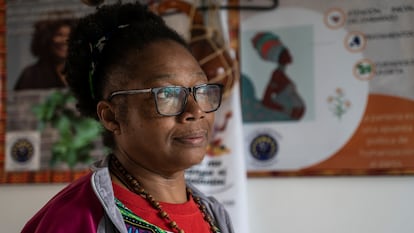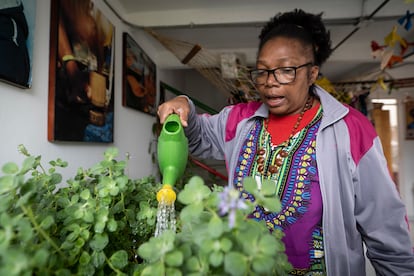‘Shamanism’ or ancestral medicine: Controversy in Colombia over health reform
Traditional Afro and indigenous medicine is nothing new. It is part of national and international medical standards, and it is practiced daily in cities like Bogotá

When Martha reaches her office, the first thing she does is water the plants: at night she dreams that they are thirsty. Before anyone can interrupt her, asking about the services at the Bosa victim support center in southwest Bogotá, she greets the herbs. “I love them, I care for them, I talk to them,” she says. Martha Rentería is a healer and midwife. Those words recently sparked controversy in Colombia, after it was announced that several strains of ancestral medicine will be included in the health policy reform proposed by Gustavo Petro’s administration.
The outgoing health minister, Carolina Corcho, indicated as much in response to a petition presented by the liberal senator Alejandro Carlos Chacón. It was one of her last actions in office: the difficulties with approving the reform she championed ended up costing her the job. Six other ministers were removed from their positions during the second major shake-up of Petro’s government, unleashed as a result of the difficulties being thrown up in Congress over the president’s reform agenda.
The references to “shamanism” upset some of the reform’s opponents, inspired memes and became fertile ground for rumors. “A massage healer instead of an orthopedist to attend a fracture, or a veterinarian for an open-heart surgery. It’s an insane asylum,” said opposition senator María Fernanda Cabal, one of the most visible politicians allied with the project of former president Álvaro Uribe.
The debate may now be reaching the public eye, but it is nothing new. According to specialists, in fact, it is practically obsolete. In 1978, when the World Health Organization released the Declaration of Alma-Ata on primary health care, the importance of including traditional indigenous knowledge in health systems was established. Those forms of knowledge — which have nothing to do with alternative medicine like homeopathy, floral essences or bioenergy — had been the primary form of healthcare long before western medicine spread across the world. Their practitioners continue to care for populations in remote areas.
“It’s a worldwide call: in the United States, in Canada, in Australia and New Zealand it’s already a constitutional imperative. I think that is missing in Colombia,” says Germán Zuluaga, a doctor from the University of Rosario who has spent his career combining modern western medicine with ancestral practices.
“The issue is being discussed in a really basic way, from the superficial political description. What’s being attempted — and what any government should do, whether left or right — is to promote, on the one hand, multiculturalism in health, and on the other, the 2014 decree that established an obligation to recognize traditional indigenous systems,” says Zuluaga. Today in Colombia, five Indigenous Health Promotion Companies (EPSI) work with communities to develop an intercultural care model.
Zuluaga says that he, too, was once skeptical. Trained in classical western medicine, when he finished his studies, he was sent to do an internship in Caquetá, at the gateway to the Amazon rainforest. There, he encountered an indigenous healer and doctor. “It was a big surprise, because despite my doubts about his knowledge, I gradually realized he was very skilled in medicine. After a few years, I gave in and understood and accepted that [traditional] medicine holds very wise, deep knowledge.”
That unexpected encounter marked the rest of his professional life. He went on to direct a research group at the University of Rosario that has scientifically proven the efficacy of many traditional treatments. Now, he states, “traditional medicine works, both in preventing and healing many diseases.”
Zuluaga’s doctoral thesis demonstrates how patients with asthma, who by Western medicinal techniques are forced to use inhalers for years, have been healed in months by traditional medicine. For him, “Western medicine is excellent when it comes to major surgeries, hip replacements, heart transplants, serious accidents. But in the management of chronic illnesses it’s very limited. Patients with chronic problems of hypertension, diabetes, osteoarthritis, don’t find good answers in Western medicine.”
Those patients are treated with medications that they must take every day, he notes, leading to the serious public health problem of overmedication. The National Pharmacology Symposium says of the issue: “An adult aged over 50 is taking an average of five different medications every day of their life.” And everyone is being prescribed the same treatments.
But how, the former ministers’ detractors asked, can the government regulate ancestral practices? How can a traditional doctor be distinguished from a charlatan? In response to the petition, the Ministry emphasized that practitioners must be “recognized and backed by the collective and organizational institutions of the area where the activities will take place.” But it did not specify that the 2014 decree already lays out the rules of the game, through the creation of the Indigenous System of Intercultural Health (SISPI).
Kilombos, the beginning of a hybrid model
Since 2014, a model of ancestral medicine in Bogotá has given some hints of how traditional practices can work in an institutional context. District secretary of health and doctor Alejandro Gómez says that this symbiosis can only be achieved through respect and recognition. “With the challenges we have, we can’t act like there’s one kind of knowledge and that the only people who know about healing are Western doctors.”
Regarding certifications, Gómez explains that “a person who calls themselves an ancestral doctor of a community should have validation from their community, from their own authorities. We can’t demand an academic certificate that doesn’t exist. We meet with traditional authorities. Only people that the community recognizes as midwives, as ancestral doctors, can play a part in this kind of district health system,” he says. “There is a risk of charlatanry, of course, but that also exists in Western medicine.”
In this regard, he says, Bogotá has made great progress: “The district’s public health system has 125 people from different ethnic groups — Afro, indigenous, Raizal, Palenquera and gypsy or Roma populations — working in the system. Of those, 32 are classified as ancestral doctors, 25 as midwives, and 39 as community managers, as well as 29 health technicians.”
Perhaps the most representative model of ancestral medicine in the city are the Kilombos, centers where the population can receive treatments based on traditional Afro knowledge. The first to begin operations was the Kilombo Niara Sharay, where Martha Rentería waters her plants. She rests only when she notices that they begin to give off a smell that indicates to her that “her daughters” are now satisfied.
A strong smell of chlorophyll welcomes visitors. Here, Rentería prepares the oils, pills and ancestral concoctions that she will prescribe. Instrumental music from the Pacific can be heard in the background, and the sound of the marimba prepares her patients to begin their healing process, which consists of “various forms of attention, all aimed at listening.”

“Eighty to 85% of the people we serve here are victims of the conflict,” says Martha. “You hear about everything. Girls who have been raped come to us, and the first thing we do is a cutting work [a kind of energy cleansing]. Then there is the physical body, an internal treatment with medicinal plants, with vaporizations, baths, and also with marinillos [a natural ovule] so that she feels good inside, because rape damages the inside a lot. These are traces that will never be erased.”
“The good thing about this kilombo is that we are scholars. For example, I look for the origin of the disease. How do I find it? Through dialogue, through touching and asking questions, and the person brings it out. Then I find the origin, because every disease has an emotional origin,” she says. These experiences have led her to develop a new concept: the “ethno-psycho-ancestral,” a mixture of Afro medicine, plants and listening with which she seeks to give her patients a holistic treatment. Psychology students from the Universidad Javeriana who conduct their internships at the kilombo have documented in their theses how the center has helped improve the lives of victims of the conflict.
“The war makes you sick,” Martha says. “You want to be listened to, listened to with patience, which is what my students do on Thursdays and Fridays. I then clean them [with medicinal plants], I let them unload. The one who listens gets sick too, because there are terrible things: a rape hurts the body of the woman who suffers it, but also the one who listens.”
Women are the central axis of Afro medicine. “When they enslaved the Blacks, who attended to the ladies? The women! In Afro ancestral medicine, the guardians are the women,” she says. She learned what she knows from her grandmother, Dolores Florinda Barreiro. “I have a lot of family who are healers [in Tumaco, on Colombia’s Pacific coast]. My grandmother was a midwife, very careful and responsible. We were all born in the house. She was a very wise woman. She rubbed, made her creams. I learned that from her, watching her.” Today, Martha’s own granddaughter watches her and imitates her massages.
Martha is not opposed to Western medicine. “In Bogotá, if I take care of a pregnant woman, with my exercises, with love, attention, companionship, solidarity, I watch how the pregnancy is going. If I see that it is not working well, I must send her for tests. She must have the attention and medical control of the Western woman.”
What she finds difficult, however, is the relationship with the institutions. There still exists the problem of how to reconcile two very different universes: one centered on on oral communication, the other on documents; one ancestral, the other modern; one empirical, the other based on laboratory tests; one linked to plants and the land, another to chemists and the pharmaceutical industry.
For ancestral medicine to enter the more orthodox health system implies that, in one way or another, it will be subject to the system’s rules. “There is endless paperwork to fill out,” Martha says. She also criticizes the prevalence of care “headed by a senior nurse. If she is not there, the kilombo cannot see patients, but if the midwife and the healer are not there, the kilombo continues to function with a manager who does not know about ancestral medicine.”
For Martha, integrating into the public health system has made the kilombo “more of the same,” meaning “obtaining a certain number of signatures per day. This implies attending at full speed, without the proper listening that is required in a healing process.” She has decided to declare herself autonomous, outside of the system. The word kilombo refers precisely to that: it is one of the names of the free communities founded by Africans and their descendants who escaped from slavery.
Sign up for our weekly newsletter to get more English-language news coverage from EL PAÍS USA Edition
Tu suscripción se está usando en otro dispositivo
¿Quieres añadir otro usuario a tu suscripción?
Si continúas leyendo en este dispositivo, no se podrá leer en el otro.
FlechaTu suscripción se está usando en otro dispositivo y solo puedes acceder a EL PAÍS desde un dispositivo a la vez.
Si quieres compartir tu cuenta, cambia tu suscripción a la modalidad Premium, así podrás añadir otro usuario. Cada uno accederá con su propia cuenta de email, lo que os permitirá personalizar vuestra experiencia en EL PAÍS.
¿Tienes una suscripción de empresa? Accede aquí para contratar más cuentas.
En el caso de no saber quién está usando tu cuenta, te recomendamos cambiar tu contraseña aquí.
Si decides continuar compartiendo tu cuenta, este mensaje se mostrará en tu dispositivo y en el de la otra persona que está usando tu cuenta de forma indefinida, afectando a tu experiencia de lectura. Puedes consultar aquí los términos y condiciones de la suscripción digital.








































